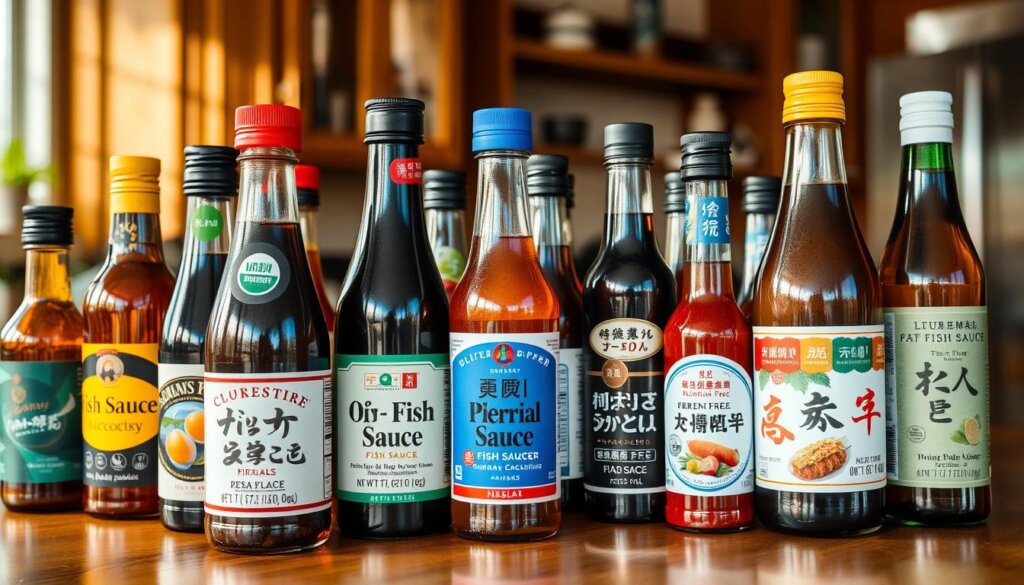When you’re looking for condiments, you might wonder if fish sauce is gluten-free. It’s popular in many Asian dishes, like Vietnamese cooking. Knowing what’s in fish sauce is key.
Most quality fish sauce, like Red Boat Fish Sauce, doesn’t have gluten. It’s made from salt, water, and fish, making it a good choice for those who need gluten-free options.
To find gluten-free fish sauce, check the ingredients and learn more about other safe options, such as Soy Gluten-Free Substitutes or the versatility of Gluten-Free Soy Sauce. This way, you can enjoy its unique taste while keeping your diet safe and satisfying.
Table of contents
- What is Fish Sauce and How is it Made?
- Is Fish Sauce Gluten Free? Understanding the Basics
- Common Ingredients That May Contain Gluten in Fish Sauce
- Reading Fish Sauce Labels for Gluten Content
- Top Gluten-Free Fish Sauce Brands
- Safe Storage and Usage Tips for Fish Sauce
- Alternatives to Fish Sauce for Gluten-Sensitive Individuals
- Conclusion
- FAQ
What is Fish Sauce and How is it Made?
Fish sauce is a liquid made from fermented fish and salt. It takes months to years to make. Small fish like anchovies or sardines, salt, and water are used. You can buy it in local stores or international markets.
Brands like Red Boat, Three Crabs, and Squid Brand are popular. The fish sauce production mixes fish and salt, then ferments them. This makes fish sauce taste and smell unique.
Different places make fish sauce in their own way. Vietnam’s nuoc mam and Thailand’s nam pla are well-known. The fermentation process changes based on the region and flavor wanted. Knowing how fish sauce is made helps us enjoy its rich taste.
Is Fish Sauce Gluten Free? Understanding the Basics
For those with celiac disease or on a gluten-free diet, knowing the basics is key. A gluten-free diet helps manage celiac disease. This is an autoimmune disorder that makes the immune system react to gluten in wheat, barley, and rye.
Gluten sensitivity can lead to bloating, diarrhea, and stomach pain. Wheat is a common gluten source in foods like bread, pasta, and cereals. But, fish sauce is made from fermented salted fish, like anchovies, in barrels. Its ingredients—fish, salt, and water—are naturally gluten-free.

Some fish sauce brands might add flavorings or preservatives with gluten. Cross-contamination can also add gluten. So, people with severe gluten sensitivities or celiac disease should be careful. Good fish sauce makers follow strict rules to avoid gluten.
Gluten-free certifications, like the Gluten-Free Certification Organization (GFCO), check for gluten levels. They ensure fish sauce is safe for those with gluten issues. Knowing about gluten-free diets and celiac disease helps make better food choices, including using fish sauce.
Common Ingredients That May Contain Gluten in Fish Sauce
When you buy fish sauce, know about gluten ingredients. Some brands have gluten from hydrolyzed vegetable protein or shared equipment. This is because of cross-contamination risks.
Gluten can hide in wheat-based additives. Cross-contamination risks are also a big worry. This is because fish sauce is made in places that also handle gluten.
Hidden Sources of Gluten
Some common hidden sources of gluten in fish sauce include:
- Hydrolyzed vegetable protein
- Wheat-based additives
- Cross-contamination from shared equipment or facilities
Cross-Contamination Risks
To avoid gluten, pick a trusted brand. Look for brands that say they are gluten-free. They should also have ways to stop cross-contamination.
Wheat-Based Additives to Watch For
Some fish sauce brands use wheat-based additives. Always check the labels. Choose a brand that is open about its ingredients and how it’s made.
| Brand | Gluten-Free Status |
|---|---|
| Red Boat Fish Sauce | Gluten-free |
| Thai Kitchen Premium Fish Sauce | Gluten-free |
| Three Crabs Brand Fish Sauce | May contain gluten |
Reading Fish Sauce Labels for Gluten Content
When you buy fish sauce, always check the labels. Make sure it’s gluten-free. Look for gluten-free certification from groups like the Gluten-Free Certification Organization (GFCO). Also, check the ingredients for gluten.
Some fish sauce brands might use hydrolyzed wheat protein. This can be hidden under “hydrolyzed vegetable protein.” To avoid this, pick a brand that clearly lists its ingredients and how it’s made. Here are some tips for reading fish sauce labels:
- Check for gluten-free certification
- Read the ingredient list carefully
- Look for transparent labeling of ingredients and production process
Only about 1 percent of Americans have celiac disease. But, 15 percent of people in the U.S. buy gluten-free foods. The gluten-free market is worth $2.6 billion. This shows more people want gluten-free options. By carefully reading fish sauce labels and choosing a trusted brand, you can find a gluten-free product that fits your diet.

Remember, fish sauce labels can be tricky. So, it’s important to be careful when looking for gluten-free fish sauce. By following these tips and picking a reliable brand, you can enjoy fish sauce’s taste and health benefits while staying gluten-free.
Top Gluten-Free Fish Sauce Brands
When looking for gluten-free fish sauce, pick a trusted brand. Look for certified gluten-free products. Brands like Red Boat, Thai Kitchen, and Ocean’s Halo are great choices. They offer a variety of fish sauce, all gluten-free.
Here are some key features of these top gluten-free fish sauce brands:
- Red Boat: Made with only anchovies and sea salt, labeled as gluten-free, and produced in a gluten-free facility.
- Thai Kitchen: Labeled gluten-free on the bottle and the official website.
- Ocean’s Halo: USDA organic, gluten-free, vegan-friendly, and soy-free, as per their website.
When picking a gluten-free fish sauce brand, look for USDA organic or gluten-free labels. These ensure the product fits your dietary needs. Always check the ingredient list and nutrition label to confirm it’s gluten-free.
Choosing a certified gluten-free fish sauce brand lets you enjoy its flavor and nutrition. This way, you can stick to a gluten-free diet.
| Brand | Product | Gluten-Free Certification |
|---|---|---|
| Red Boat | Premium Fish Sauce | Gluten-free facility |
| Thai Kitchen | Premium Fish Sauce | Gluten-free label |
| Ocean’s Halo | Vegan Fish Sauce | USDA organic, gluten-free |
Safe Storage and Usage Tips for Fish Sauce
For fish sauce storage, keep the bottle cool and dry. Stay away from sunlight and heat. This keeps the fish sauce good and safe. Always check the expiration date before you use it.
When using fish sauce, start with a little. It’s strong. You can use it to marinate, dress, or season dishes. Here are some tips:
- Keep fish sauce in the fridge to slow down fermentation and keep flavor.
- Use a clean spoon or pourer to avoid contamination.
- Try different amounts and mixtures to find the right flavor for your recipes.
By following these fish sauce storage and usage tips, you can enjoy its full flavor and health benefits. This way, you keep it quality and safe.

| Fish Sauce Brand | Protein Content | Sodium Content |
|---|---|---|
| Red Boat | 4 grams per tablespoon | 1500 mg per tablespoon |
| Megachef | 2 grams per tablespoon | 1360 mg per tablespoon |
| Three Crabs | 2 grams per tablespoon | 1670 mg per tablespoon |
Alternatives to Fish Sauce for Gluten-Sensitive Individuals
If you’re gluten-sensitive or don’t like fish sauce, there are other choices. You can try homemade options or pick from gluten-free commercial substitutes. These can give you a similar taste to fish sauce without gluten.
Fish sauce alternatives like tamari, coconut aminos, and anchovy paste are popular. They can replace fish sauce in many recipes. Soy sauce is also an option, but it might have gluten.
Homemade Options
At home, you can make gluten-free substitutes with shiitake mushrooms, liquid aminos, and soy sauce. This way, you know what’s in it. Seaweed, like nori or kombu, is another choice. It’s rich in glutamate and tastes like fish sauce.
Commercial Substitutes
Many fish sauce alternatives are sold in stores. Look for vegan fish sauces, mushroom and soy sauce broths, and coconut aminos. These are often gluten-free substitutes. Brands like tamari and coconut aminos are known for their taste and low sodium.
When picking a commercial substitute, check the label. Look for gluten-free or vegan labels. This makes sure it fits your diet and tastes.
| Product | Calories | Carbohydrates | Protein | Sodium |
|---|---|---|---|---|
| Vegan Fish Sauce | 15 | 1g | 1g | 1330mg |
| Coconut Aminos | 40 | 2g | 0.05g | 66mg |
| Worcestershire Sauce | 12.3 | 3.07g | 0g | 208mg |
Conclusion
Exploring gluten-free fish sauce means knowing how it’s made and the risks of gluten. Choosing a trusted brand and checking labels helps avoid gluten. Brands like Red Boat and Thai Kitchen offer gluten-free fish sauce, making it safe for those with gluten issues.
Making your own gluten-free fish sauce is easy and lets you control what goes in it. This is great for those with celiac disease or gluten sensitivity. They can enjoy the tastes of Thai and Vietnamese food without gluten. Always look for the GFCO logo to make sure it’s safe.
In short, gluten-free fish sauce is a tasty and healthy choice. Knowing about gluten-free certifications and avoiding cross-contamination is key. This way, you can enjoy the flavors of Southeast Asian food safely.
FAQ
What is fish sauce and how is it made?
Fish sauce is a liquid condiment made from fermented fish and salt. It uses small fish like anchovies or sardines, salt, and water. The fish and salt mix ferments for months to years.
Is fish sauce gluten-free?
Fish sauce is usually gluten-free. But, some brands might have gluten from additives or cross-contamination. Always check the label and choose a trusted brand.
What are the hidden sources of gluten in fish sauce?
Gluten can hide in fish sauce from wheat-based additives. It can also come from shared equipment or facilities.
How do I read fish sauce labels for gluten content?
Look for labels with certifications from groups like the Gluten-Free Certification Organization (GFCO). Also, check the ingredient list for gluten.
What are some top gluten-free fish sauce brands?
Top brands include Red Boat, Thai Kitchen, and Ocean’s Halo. They offer premium, budget-friendly, and certified gluten-free fish sauce.
How do I store and use fish sauce safely?
Store fish sauce in a cool, dry place, away from sunlight and heat. Use it within months of opening and check the expiration date. Start with a small amount as it’s strong.
What are some alternatives to fish sauce for gluten-sensitive individuals?
For those sensitive to gluten, try homemade fish sauce or commercial substitutes like tamari, coconut aminos, and anchovy paste.
What is a gluten-free diet and why is it important?
A gluten-free diet is key for those with celiac disease or gluten intolerance. It helps manage the condition and prevent complications.
Can I make my own gluten-free fish sauce at home?
Yes, you can make gluten-free fish sauce at home. Use gluten-free ingredients like anchovies, salt, and water. It’s a good option for those sensitive to gluten.





